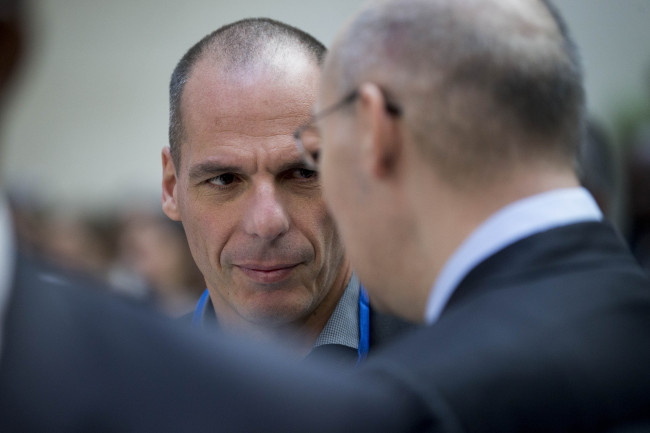WASHINGTON ― Greece was told Saturday to urgently deliver a detailed fiscal and debt plan to official lenders as the IMF-World Bank spring meetings wound up amid escalating worries of a looming default.
As Athens’ talks with creditors continued in Paris, both IMF Managing Director Christine Lagarde and European Central Bank chief Mario Draghi warned in Washington that Greece has not provided enough information about how its economic and reform plans will impact its finances.
With Greece seeking the release of another 7.2 billion euros ($7.8 billion) in bailout funds from the European Union, Draghi cautioned that not reaching an agreement would take the situation into “uncharted waters.”
He and Lagarde said that however the new leftist Greek government of Alexis Tsipras wanted to adjust policies under the country’s massive bailout, it still needed to demonstrate the effect on the budget and debt.
“More work, much more work is needed now, and it’s urgent,” Draghi said, against the backdrop of increasing fears for the very existence of the eurozone.
 |
Yanis Varoufakis, Greece’s finance minister (left), talks to Kairat Kelimbetov, governor of the National Bank of Kazakhstan, before an IMF governors’ group photo during the IMF and World Bank Group Spring Meetings in Washington, D.C., Saturday. (Bloomberg) |
“Any government is free to choose what they can do,” he added.
“We have to have an overall framework ... we have to have a methodology in place whereby which we can assess the quantitative impact, the fiscal impact of these proposals.”
“At this point in time is to have in place a framework that allows a well-informed political discussion by the Eurogroup and the Greek government.”
Lagarde said she and her No. 2 at the IMF, David Lipton, had each met Greek Finance Minister Yanis Varoufakis over the past two days and pressed him for a more detailed plan.
“The job as finance minister ... is to go deep into the analysis, pull out the numbers, assessing the efforts undertaking, making a few hypotheticals about what it will deliver in terms of growth, in terms of fiscal revenues, or spending,” she said.
“It’s not a question of racing to the end. It’s a question of doing all the work that needs to be done.”
Greek negotiators were meeting in Paris Saturday with representatives of the European Union, the European Central Bank and the International Monetary Fund to try to thrash out a deal ahead of the April 24 gathering of the Eurogroup finance ministers in Riga, Latvia.
The Greek government needs new financing urgently to pay salaries at the end of the month and then make a series of debt payments to the International Monetary Fund and the ECB over the next three months.
IMF officials said they do not know how much cash the Greek government has, but that between now and August the country has to come up with $10-11 billion to service its debts, and that reaching a deal on the release of funds and then a new support program was crucial.
In Athens, officials said that Greece would soon get billions of euros from a gas pipeline deal with Moscow that would give it a significant cushion for weeks.
But Moscow has denied the claim and European officials said it would not solve the country’s chronic problems.
Asked if Greece could default on its huge debt, Draghi replied: “I don’t want to even contemplate such an event. ... The Greek leaders repeatedly state that they want to honor all their obligations.
“We all want Greece to succeed. The answer is in the hands of the Greek government.”
Athens has come under intense pressure in Washington, with U.S. President Barack Obama calling on the country to proceed with badly needed reforms.
Luis De Guindos, Spain’s economy minister, also weighed in, stressing that Athens needed to get to work now.
“Time is of the essence,” he told journalists in the U.S. capital.
“Everybody has to try to avoid that any accident occurs and that any nonpayment occurs. That would be negative for everybody.”
However, he added, “The ones that need to work with more intensity are no doubt the Greek government.”
(AFP)








![[Today’s K-pop] Blackpink’s Jennie, Lisa invited to Coachella as solo acts](http://res.heraldm.com/phpwas/restmb_idxmake.php?idx=644&simg=/content/image/2024/11/21/20241121050099_0.jpg)